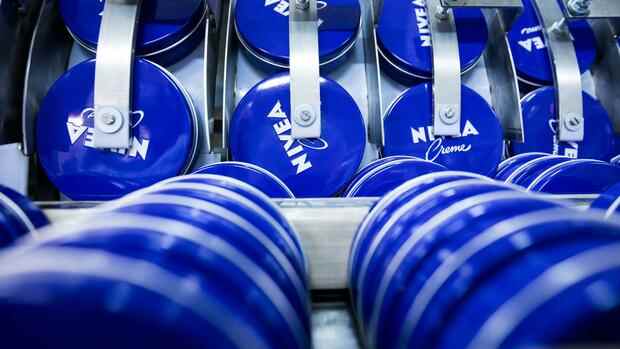Dusseldorf Beiersdorf and Unilever got off to a surprisingly good start to the year. The Nivea manufacturer grew organically by 10.3 percent in the first three months, the British manufacturer of Dove or Ax increased its sales by 7.3 percent. Both consumer goods manufacturers clearly exceeded analysts’ expectations with the figures presented on Thursday.
Most recently, the Ariel manufacturer Procter & Gamble (P&G) and the perfume producer L’Oréal had reported above-average numbers – as did the fragrance and flavor manufacturer Symrise, which supplies these companies. P&G increased its sales in the past quarter by ten percent, L’Oréal by 13.5 percent and Symrise by 8.3 percent.
The numbers show that the consumer goods industry has overcome its corona low, but at the expense of consumers. In the first few months, the branded companies benefited above all from price increases, which they were able to pass on to retailers and thus to customers.
Unilever increased prices by 8.3 percent while sales volume fell by one percent. Beiersdorf also increased sales primarily through price increases.
Top jobs of the day
Find the best jobs now and
be notified by email.
Consumer goods companies are in a dilemma: they must try to react to the sharp rise in raw material and energy costs. However, they cannot raise prices too much because consumers, who are already suffering from inflation, will switch to cheaper products such as private label products. So far, the price increases have not resulted in customers buying fewer Beiersdorf products, said CFO Astrid Hermann.
Beiersdorf and Unilever recovered particularly in product categories that had suffered the most from the pandemic restrictions: deodorants, facial cleansers and lip care. L’Oréal, with brands such as Maybelline and Lancôme, has also recorded double-digit growth in lipsticks in Germany since the beginning of April.
During the pandemic, the business with decorative cosmetics such as nail polish, make-up and lipstick in particular collapsed, as there were few occasions to put on make-up and go out during the lockdown and stationary specialist shops were also closed. Although Corona increased the demand for hygiene and disinfectants, this could not compensate for the losses in the higher-margin cosmetics business.
At Beiersdorf, the luxury brand La Prairie is benefiting with organic sales growth of 11.1 percent. High-quality cosmetics are often bought at airports. Because people are flying more again, this sales channel is becoming more important again for branded companies. The core brand Nivea should also benefit from the fact that consumers are increasingly asking for sun protection products due to more vacation trips.
Customers must expect further price increases
Despite the good news, consumer goods companies have been struggling with rising raw material costs and incomplete supply chains for many months. For example, Henkel recorded a total of 1,400 delivery interruptions in 2021, while there were only up to 250 before Corona, according to the recent Annual General Meeting.
The Russian war of aggression in Ukraine is further exacerbating the problems and also causing rising energy costs. That should reduce margins and profits. P&G is assuming higher sales than last, but also lower profits.
Manufacturer Unilever now expects costs of 2.7 billion euros in the second half of the year – 1.2 billion more than initially targeted.
(Photo: BLOOMBERG NEWS)
Competitor Unilever now expects costs of 2.7 billion euros in the second half of the year – 1.2 billion more than initially targeted. The British want to react to this with further price increases. So far, two-thirds of the rising costs have been cushioned in this way.
Beiersdorf is also trying to react by passing on the costs and efficiency measures. For consumers, this means that they must expect further price increases for cosmetics.
Cosmetics companies only indirectly affected by the Ukraine war
Many cosmetics companies are indirectly affected by the Russian war in Ukraine. Apart from Henkel, which generated five percent of its sales in Russia and three percent in Ukraine in 2021, the sales of many manufacturers in the two countries are hardly significant.
Beiersdorf, for example, generates three percent there. The Nivea manufacturer is sticking to its sales growth in the mid-single-digit range for the year as a whole. He even expects to be able to slightly increase the margin in the consumer business. However, due to rising costs, Unilever pointed out that the profit margin will now be at the lower end of the targeted 16 to 17 percent.
As a result of the war, L’Oréal is suffering from bottlenecks in important primary products, “especially oils for the manufacture of cosmetic products, packaging materials and glass bottles,” writes DZ Bank analyst Michael Pohn. In his opinion, L’Oréal will succeed in passing on the additional costs to consumers.
Henkel will publish its quarterly figures next Thursday. The Düsseldorf-based company had recently ended its business in Russia after a long period of criticism. How this affects the proceeds could then become clearer. In addition, CEO Carsten Knobel wants to present details of the corporate restructuring, in which employees are also to be laid off.
More: Persil manufacturer Henkel is closing business in Russia

